Everything you need to know about parasitic worms
Discover everything there is to know about parasitic infection worms, their types, methods for diagnosis, and treatments.
Everything you need to know about parasitic worms
Discover everything there is to know about parasitic infection worms, their types, methods for diagnosis, and treatments.
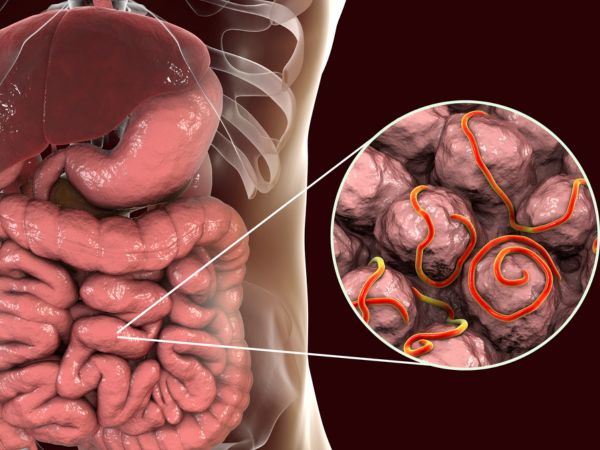
What are parasitic worms?
Parasitic infections or worms are medical conditions that are caused by parasites living and reproducing in the body. 24%, or 1.5 billion of the world’s population have been infected with intestinal parasitic infections.
Parasitic worms can be microscopic or visible to the naked eye. These parasites live off of other organisms to survive in the body. Parasitic infections are most likely to be contracted from the consumption of contaminated food or water or undercooked meat, or from contaminated surfaces or bug bites.
What are parasitic worms?
Parasitic infections or worms are medical conditions that are caused by parasites living and reproducing in the body. 24%, or 1.5 billion of the world’s population have been infected with intestinal parasitic infections.
Parasitic worms can be microscopic or visible to the naked eye. These parasites live off of other organisms to survive in the body. Parasitic infections are most likely to be contracted from the consumption of contaminated food or water or undercooked meat, or from contaminated surfaces or bug bites.
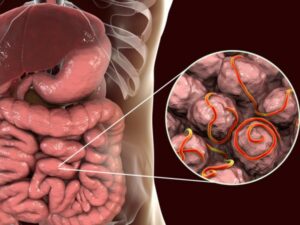
What are the types of parasitic worms?
Parasites spread through various means, including contaminated food/water, person-to-person contact, or vectors like mosquitoes or fleas. Understanding their type assists in diagnosing, treating, and preventing the diseases they cause.
Parasites causing diseases in humans can be classified into 3 main types:
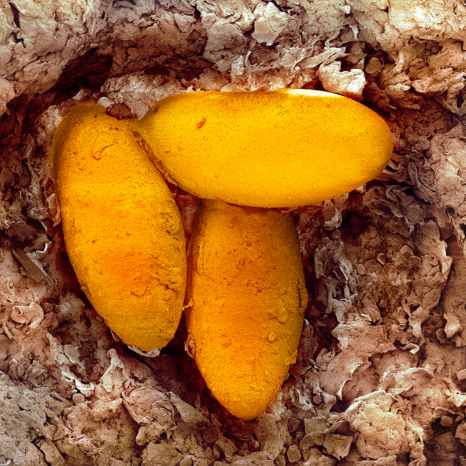
Ectoparasites
- These parasites live on the exterior of the host’s body and often transmit infections through blood. Common examples include:
- Fleas: Insects that spread diseases by biting their host or being ingested
- Lice: Head lice or pubic lice that can spread through close contact or sharing personal items
- Mites: Arachnids, close to the family of spiders and ticks, which can cause conditions like scabies
- Ticks: Arachnids that burrow into the surface of the skin and are found in wooded or grassy areas

Helminths
- These are parasites or worms residing and present in the gastrointestinal tract. The main types include:
- Flukes (Trematodes): Flatworms that spread through contaminated water or from aquatic animals, and infect various organs
- Tapeworms (Cestodes): Flatworms that live in the intestines, spreading through eggs in the host’s faeces or infected food or water
- Roundworms (Nematodes): Small parasites found in the intestines, which often spread through infected soil or faeces
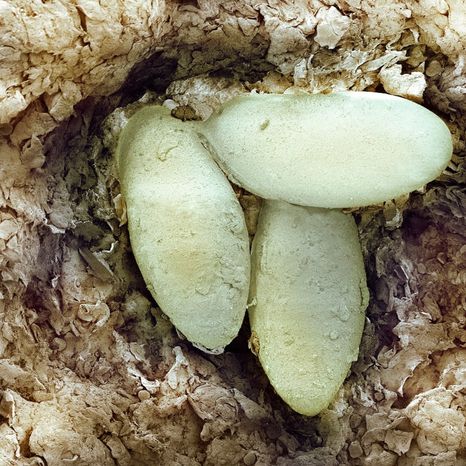
Protozoans
- Single-celled organisms, which are often microscopic, residing in the intestines, blood, or tissues of the body. Notable types include:
- Amoeba: Moves using extensions within the body and can potentially cause dysentery
- Ciliates: Move with hair-like structures in the body and can potentially cause dysentery
- Flagellates: Can cause diseases like giardiasis and sleeping sickness
- Sporozoans (Apicomplexans): Can cause diseases like malaria and cryptosporidiosis by consuming host fluid or food

Where can you get a parasitic infection?
Parasitic infections usually enter the body either through the mouth or skin. Patients are more likely to contract it based on their present health condition, hygiene, lifestyle, geographic location, and occupation.
Patients are more prone to parasitic infections if they:
- Have a weak immune system or are already down with another illness
- Get bitten by mosquitoes, ticks, flies or other insect bites
- Consume undercooked meat or contaminated food
- Live in or travel to tropical regions
- Have a lack of a clean supply of drinking water
- Swim or bathe in lakes, rivers, or ponds where parasites are common
- Work in childcare, work with soil regularly, or work in other contexts where you come into contact with faeces consistently
- Partake in unprotected sex
- Engage in oral sexual activity
When should I see a doctor?
Parasitic infections usually enter the body either through the mouth or skin. Patients are more likely to contract it based on their present health condition, hygiene, lifestyle, geographic location, and occupation.
Patients are more prone to parasitic infections if they:
- Have a weak immune system or are already down with another illness
- Get bitten by mosquitoes, ticks, flies or other insect bites
- Consume undercooked meat or contaminated food
- Live in or travel to tropical regions
- Have a lack of a clean supply of drinking water
- Swim or bathe in lakes, rivers, or ponds where parasites are common
- Work in childcare, work with soil regularly, or work in other contexts where you come into contact with faeces consistently
- Partake in unprotected sex
- Engage in oral sexual activity
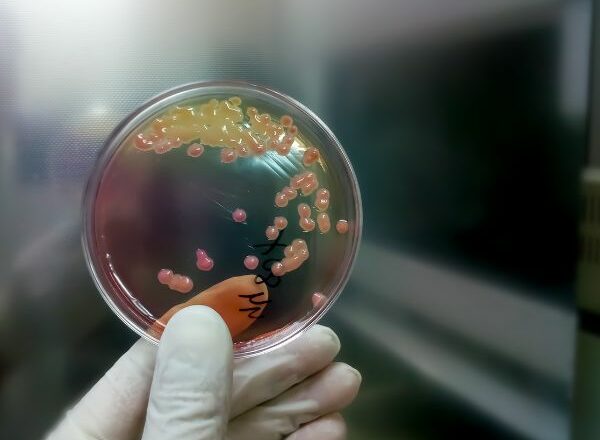
How to prevent parasitic infections
There are several measures that can be taken to lower the risk of contracting a parasitic worm infection, such as:
- Using protection whilst having sex
- Washing hands regularly, especially after handling uncooked food or cleaning out faeces
- Cooking food to its recommended and ideal internal temperature and placing a timer while cooking to prevent undercooked food
- Drinking clean water or bottled water labelled with purification seals
- Making sure you don’t swallow unpurified water from lakes, streams, ponds, or unknown water sources
- Avoiding contact with animal faeces during pregnancy
- Protecting yourself against bug bites
- Maintaining good hygiene practices
- Avoiding the consumption of coffee, alcohol, sugar, and refined grains
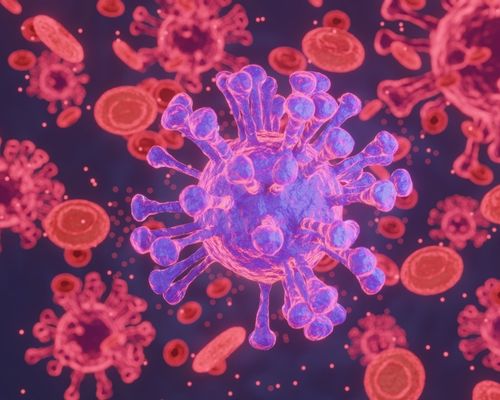
How to prevent parasitic infections
There are several measures that can be taken to lower the risk of contracting a parasitic worm infection, such as:
- Using protection whilst having sex
- Washing hands regularly, especially after handling uncooked food or cleaning out faeces
- Cooking food to its recommended and ideal internal temperature and placing a timer while cooking to prevent undercooked food
- Drinking clean water or bottled water labelled with purification seals
- Making sure you don’t swallow unpurified water from lakes, streams, ponds, or unknown water sources
- Avoiding contact with animal faeces during pregnancy
- Protecting yourself against bug bites
- Maintaining good hygiene practices
- Avoiding the consumption of coffee, alcohol, sugar, and refined grains



What are the symptoms of parasitic infections?
Symptoms of a parasitic infection in humans can vary depending on the type of parasite and the affected area of the body.
Common signs and symptoms include:
Gastrointestinal issues
- Bloating or gas
- Nausea and vomiting
- Inconsistent stools
- Unexplained weight loss
- Abdominal pain or discomfort
Skin problems
- Having dry skin
- Lesions or ulcers
- Rashes, itching, or sores
- Skin irritation or redness
- Breaking out of the skin
Fatigue and weakness
- Low motivation
- Lack of energy
- Feeling weakness
- Constantly feeling tired
- Experiencing constant mood swings
Sleep disturbances
- Lack of energy
- Difficulty sleeping
- Difficulties in waking up
- Disturbed sleep patterns
- Experiencing constant mood swings
These symptoms can sometimes be vague or mimic other health issues, so it’s important to consult a healthcare professional if you suspect a parasitic infection. Not everyone with a parasitic infection will experience symptoms, especially in the case of mild infections or individuals with a strong immune system.
How to get a diagnosis of a parasitic worm infection
If symptoms are worsening and becoming more present and are interfering with your daily routine, it would be best to get a consultation with your gastrointestinal specialist.
Diagnostic tests will be necessary to identify and conclude your treatment, such as:
- Faecal test: The submission of a stool sample and having it checked for parasites, larvae, or eggs, can detect the presence of parasites in your system.
- Blood test: A blood test can be used to detect types of parasites present in your bloodstream.
- Imaging tests: Imaging tests such as CT scans, MRIs, or X-rays can be used to detect organ injury which was caused by parasites.
- Tape test: A tape test involves placing clear tape around the anus or rear end. The tape can be examined and evaluated under a microscope for the presence of parasites.
See a gastrointestinal specialist today
The Sydney Gut Clinic has a team of dedicated and highly experienced gastrointestinal specialists who are trained to provide support and treatment for all types of gastrointestinal conditions. Getting treatment can help prevent the spread of the infection, so if you suspect you have a parasitic infection, make an appointment with your trusted clinic as soon as possible.
If you’re experiencing parasite symptoms, visit our clinic for a consultation for a parasite cleanse in Australia.



See a gastrointestinal specialist today
The Sydney Gut Clinic has a team of dedicated and highly experienced gastrointestinal specialists who are trained to provide support and treatment for all types of gastrointestinal conditions. Getting treatment can help prevent the spread of the infection, so if you suspect you have a parasitic infection, make an appointment with your trusted clinic as soon as possible.
If you’re experiencing parasite symptoms, visit our clinic for a consultation for a parasite cleanse in Australia.



FAQs
What naturally kills parasites in the body?
Consuming more raw garlic, pumpkin seeds, pomegranates, beets, and carrots in your diet are traditional methods to kill parasites. Staying hydrated and drinking a lot of water or fluids can help flush out your system. Make sure to get advice from your doctor before testing out natural methods of killing parasites in your body.
Where do parasites hide in the body?
Parasites can hide and reside in various parts of the body, depending on the type of parasite and its life cycle. Some common locations where parasites can hide include the gastrointestinal tract, liver, bloodstream, tissues, lungs, nervous systems, skin, and tissues.
How long can worms live in your body?
Adult worms can live up to 17 years in the human body and can continue to make and spread parasites during this time frame.
Do deworming tablets work?
Before getting treatment or medication for worm infections, it is important to consult your doctor. However, medicine should start to work after it is taken. It may take several days to kill all the worms present in your body, so it’s important to take the medicine as a pharmacist or doctor advises you.
